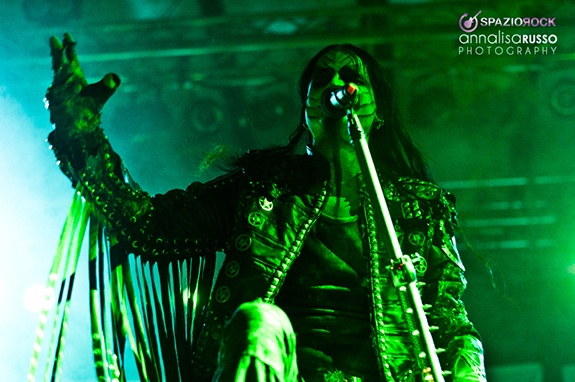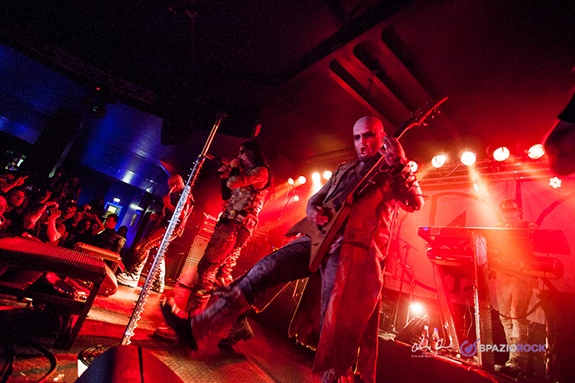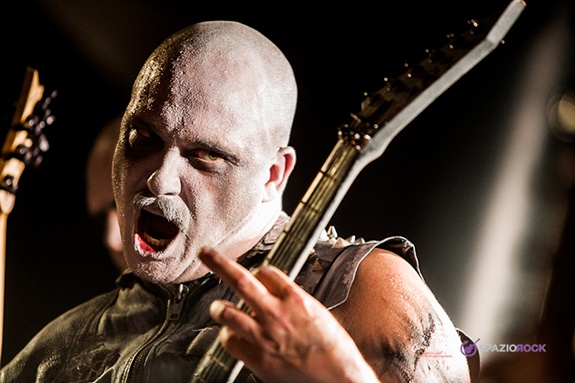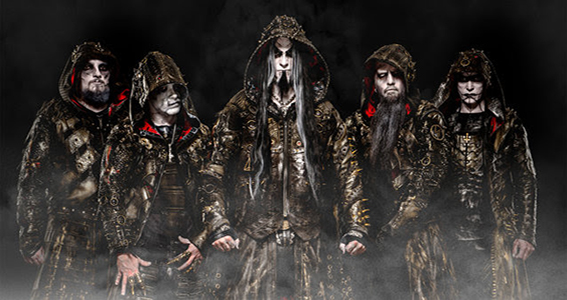SCROLL DOWN FOR ENGLISH VERSION
Ciao Sven, bentornato su SpazioRock! Innanzitutto complimenti per i 25 anni di carriera. È un ottimo risultato.
Oh… grazie, grazie!
Sono passati ben 8 anni da “Abrahadabra”. Come mai un così ampio lasso di tempo prima di dare alle stampe un nuovo album?
Abbiamo suonato dal vivo fino al 2014 e di solito ci prendiamo una pausa dopo ogni ciclo di concerti. Questa volta è stato un poco differente, visto che ci abbiamo messo un po’ di più, ma siamo comunque stati al lavoro sul materiale per il nuovo album dal 2012 fino ad un paio di anni fa, quando abbiamo iniziato a chiudere un po’ di canzoni e a dar loro la struttura definitiva. Quindi, dall’esterno può sembrare che non abbiamo fatto nulla ma in verità ci siamo occupati di diverse cose…
…il DVD dello scorso anno, per esempio…
…già, anche il DVD ha richiesto più tempo del dovuto, abbiamo dovuto remixare molte cose. Si è trattato di molte cose che hanno richiesto molto tempo ed inoltre abbiamo anche dovuto dare una sistemata al gruppo, sia sotto l’aspetto del business che quello musicale. Noi tre (Silenoz, Galder e Shagrath, ndr.) siamo diventati nuovamente padri, quindi anche sul fronte privato sono successe molte cose. Prima che te ne accorgi il tempo vola via.
Dopo le tematiche legate al Libro della Legge di Aleister Crowley in “Abrahadabra”, cosa dobbiamo aspettarci da questo nuovo album?
Abbiamo deciso di non parlare troppo dei testi perché vogliamo che l’ascoltatore vi si immerga mentre guarda il vinile o mentre ascolta l’album. Detto questo, i testi guardano molto all’abisso metafisico, per così dire, quindi non vi è nulla di conclusivo. Le parole possono avere un diverso significato per me rispetto a te. È il potere delle parole unite alla musica. Volevamo che l’ascoltatore lasciasse correre l’immaginazione. Credo che quando ascolti la musica unita ai testi, per quelli che prendono in considerazione anche le liriche, ti si aprirà una nuova dimensione, una uova realtà ti si presenterà.

Quanto siete soddisfatti da un processo di scrittura ristretto solo ai tre membri fondamentali della band?
Questo trio si è occupato di scrittura fin dal 2000, quindi non è nulla di nuovo per noi tre avere a che fare con l’aspetto decisionale e con l’arrangiamento delle canzoni. Crediamo che abbia funzionato molto bene perché più cuochi hai in cucina, maggiore confusione avrai. Funziona molto bene: siamo tre individui differenti, siamo dei maschi alfa e quindi devi cercare di lasciare da parte il tuo ego quando scrivi le canzoni perché siamo anche i produttori di noi stessi, quindi devi saper prendere le distanze e cercare di vedere in modo oggettivo quello che può funzionare all’interno di una canzone. Credo che siamo molto maturati, siamo molto cresciuti… non si tratta che io debba per forza avere un mio riff nelle mie canzoni, o che Shagrath debba mettere le sue tastiere nelle sue canzoni. Bisogna fare ciò che è meglio per la canzone. Credo che questo sia un qualcosa di cui siamo molto orgogliosi, specialmente in questo album. Siamo riusciti a far funzionare questa dinamica nel modo giusto.
Quanto, se vi è stato, hanno portato gli altri due musicisti o gli ospiti esterni?
L’album non suonerebbe così se non fosse stato per il contributo del batterista e del tastierista. Suonano in modo incredibile su questo album, specialmente il nostro batterista. Abbiamo preteso molto da lui, e anche lui ha preteso molto da sé stesso. Non avrebbe suonato uguale se non fosse stato per il loro tocco. Non hanno fatto parte del processo creativo ma hanno di certo contribuito con idee ed il loro tocco.
Cosa mi puoi dire degli ospiti speciali, tipo il coro?
Il coro è stato trascritto dalle nostre idee. Gaute Storås, che ci ha già aiutato in passato con la trascrizione dell’orchestra, ci ha dato nuovamente una mano. Tutto questo è basato sui parti di coro campionate realizzate da noi. Abbiamo anche deciso di tenere questi campionamenti in aggiunta al vero coro che sul questo nuovo album canta ancora più frasi. Credo che sia veramente ottimo, è venuto fuori veramente bene.
La copertina in toni di grigio è estremamente elaborata e piena di particolari interessanti. Cosa volevate rappresentare?
Volevamo ottenere qualcosa che fosse intricato e dettagliato ma che allo stesso tempo trasmettesse una sensazione di primitività, una sensazione di vecchio ed arcaico, come quando osservi delle incisioni su legno o cose del genere, come una sensazione di un culto, un qualcosa di esoterico. Siamo partiti da zero alla lavorazione di questo album, quindi abbiamo pensato che volevamo qualcosa di nuovo, qualcosa di differente anche per la parte visiva. E quindi non è la tipica copertina che ti aspetteresti dai Dimmu, che è una cosa buona. Si sposa bene con la musica.

All’interno della clessidra appare il Vaticano nella parte alta e, immagino, il Vaticano distrutto nella parte bassa…
…tutto ciò che ti ispira di più, è questa l’idea alla base della copertina. La puoi capovolgere e apparirà quasi identica. L’idea era di avere questa sensazione come se fosse uno specchio, come se non tutto quello che vedi è come appare veramente. È più come se noi sappiamo che vi sono altre realtà connesse con quella che vediamo. Questa è l’idea generale dietro la copertina…
...è molto interessante. Perché avete scelto il Vaticano?
Sarebbe potuto essere anche qualcos’altro, ma vi sono così tante cose legate al Vaticano, in segreto. Per me, il modo in cui tengono nascoste le informazioni al pubblico, da molti e molti anni, per me quella è stregoneria, perché tu stai cercando di nascondere qualcosa che il pubblico non credi debba venirne a conoscenza.
“Council Of Wolves And Snakes” è forse il brano che non ti aspetteresti dai Dimmu Borgir, con elementi black metal, una piccola componente sinfonica ed anche una componente folk nativo americana. Come è nato?
Non è che buttiamo giù a tavolino che tipo di canzoni realizzeremo. Succedono e basta. Una volta che abbiamo un’idea interessante cerchiamo di lavorarci attorno e forse questa canzone nello specifico è un po’ più sperimentale o inaspettata, come hai detto tu, da parte dei Dimmu. Mentre stavamo lavorando, tutto ha preso la giusta forma. Tutti i pezzi di quella canzone sono andati a posto nel giusto modo. Anche il ritmo della batteria ha un che di sciamanico, ti trasmette quasi una trance, con anche la voce sciamanica. Credo sia un’ottima rappresentazione della componente eterica dell’album.
“Rite of Passage” è una traccia strumentale molto introspettiva. Non è la tipica outro che ci si aspetta in un album metal. Dura la bellezza di 5 minuti. Quale sono i motivi che vi hanno fatto propendere per questa scelta?
Ci è sembrato che… quando ascolti questo album vi sono molte informazioni che ti colpiscono. Un eccesso di informazioni. Devi ascoltarlo diverse volte prima di riuscire a decifrare ogni strato. Credo che quando ne raggiungi la fine sia un buon modo per rilassarsi dal furioso assalto di informazioni musicali. Abbiamo già avuto qualcosa di simile in passato. Su “Puritanical Euphoric Misanthropia” avevamo “Perfection Or Vanity” che è quello stesso tipo di outro. Questo brano proviene dalla stessa visione. Non pensavamo di avere bisogno di un brano con voce, parla da solo, è come un rituale che ti porta in un altro mondo. L’ultima parola che Shagrath urla nell’album è “free” e credo che avere “Rite Of Passage” senza alcuna parola all’interno sia la scelta giusta per passare a quello che succederà dopo.

In “Abrahadabra” avete utilizzato diversi cantanti, da Snowy Shaw a Agnete Kjølsrud e Kristoffer Rygg, mentre con “Eonian” solo il coro. Cosa è cambiato nella mentalità dei Dimmu Borgir tra i due dischi?
Credo che volessimo continuare con quella che viene chiamata voce pulita ma secondo una visione nuova, più fresca. Siamo tutti fan dei grandi cori e soprattutto in questo album ve ne sono davvero tanti. Per qualcuno con cui ho parlato ve ne sono anche troppi! Diciamo che è una scelta voluta perché volevamo che il coro avesse un impatto cinematografico su questo album. Quando stiamo lavorando sulle canzoni mi piace molto l’idea che il coro dovrà cantare parti del testo. Hanno fatto un lavoro davvero fantastico, sono molto professionali, veloci, è meraviglioso lavorare con quei ragazzi!
Da dove deriva la scelta di utilizzare “Interdimensional Summit” come primo singolo dell’album? Non credi che faccia nascere nell’ascoltatore un’idea sbagliata di quello che poi sarà l’album?
Dovevamo scegliere un singolo, come prima cosa, avevamo una scadenza. Avremmo potuto benissimo scegliere un’altra canzone senza alcun problema ma credo che, dato che eravamo stati via per molto tempo, avevamo bisogno di qualcosa che fosse rappresentativo del precedente lavoro anche in questo. Avremmo potuto scegliere “Council Of Wolves And Snakes” come primo singolo ma poi i fan avrebbero detto cose tipo “ma cosa è questo!”. Guardando alle reazioni, vi è un 2% che ne è rimasto scontento quindi credo che sia un ottimo modo per introdurci di nuovo nella scena musicale. È solo uno dei pezzi del puzzle che compongono l’album.
Sembra esserci un forte legame tra i Dimmu e la Nuclear Blast. 21 anni insieme. Cosa rende così ottima questa unione?
Credo che… quando abbiamo firmato con la Nuclear Blast agli inizi loro erano ancora in fase di crescita. Avevano molto successo grazie a In Flames, Hammerfall, Therion, band di quel genere, e poi siamo arrivati noi. Ci siamo aiutati a vicenda, eravamo nella stessa barca e questa relazione di lavoro è stata ottima nel corso degli anni e quindi non vediamo perché cambiare qualcosa che funziona! Certo, abbiamo rinegoziato il nostro contratto nel corso degli anni come fanno anche le altre band. Ci sembra che loro siano come un gruppo di fan della musica metal, hanno passione e pensano a cosa sia meglio fare per la band. Credo che sia un aspetto molto importante quando si tratta di musica metal. Se lavorassimo con una etichetta più grande, una etichetta che si occupa di musica mainstream, non credo che farebbe al caso nostro. Forse guadagneremmo qualcosa di più ma la nostra arte non avrebbe visibilità perché non sanno come distribuire la musica metal o la nostra musica in generale. Siamo molto soddisfatti di lavorare con loro.
Ad ogni nuovo album date vita a nuovi costumi. Quale è l’idea di partenza per questi nuovi abiti?
Non vi è nulla di particolare dietro… ho letto commenti tipo “assomigliate ad Assassin’s Creed” per via dei cappucci. Non siamo la prima band che utilizza dei cappucci. Fondamentalmente volevamo impiegare il nero, il rosso e l’oro, che sono colori rituali. Questo era lo scopo principale. I tizi che hanno realizzato i costumi hanno lavorato veramente molto a lungo, e questo è stato un altro motivo del ritardo nell’album visto che i costumi non erano stati finiti in tempo. Sono così dettagliati. Volevamo avere qualcosa che andasse d’accordo con l’atmosfera esoterica dell’album, sia per la copertina che per i colori rituali dei vestiti.
Siete di nuovo ricorsi ad un titolo da una parola sola, dopo “Abrahadabra”. Cosa volete trasmettere con questo taglio rispetto al passato?
Credo che fosse la cosa giusta avere di nuovo un titolo di una parola sola perché, “Eonian”, dice veramente molto. Per me, rappresenta tutto ciò che è, ciò che è stato e ciò che sarà sempre. Questa è la mia visione. All’interno di questa struttura vi sono molti significati che può collegare con quel titolo. Il primo album aveva un titolo da tre parole, ma poi c’è stato “Stormblåst”! La numerologia e la simmetria sono fattori importanti.
ENGLISH VERSION
Hi Sven, welcome back to SpazioRock! First of all, congratulations for the 25th anniversary of Dimmu Borgir career. It’s a great goal.
Oh… thank you, thank you!
It’s been 8 years since the release of “Abrahadabra”. Why did it take so long for you guys to release a new album?
We were playing live till 2014 and we usually have a break after each touring cycle. This time it was a little different because it took a bit longer, but we have been working on the new material for the new album since 2012 up until a couple years ago when we actually started to conclude with songs and finalized songs’ structures. So, from the outside it looks like we haven’t been doing anything but we actually have been working on stuff…
…the DVD from last year, for example…
Yeah, the DVD also took a lot longer that expected, we had to remix a lot of stuff. It was a lot of stuff going slow, also we kind have to take a regroup, with the situation both on the business side and the musical side. The three of us (Silenoz, Galder e Shagrath, Ed.) became fathers again, so on the private side there’s a lot of stuff happening too. Before you know the time goes by.
After the thematic connected to Aleister Crowley’s Book Of The Law on “Abrahadabra”, what do we have to expect from this new album?
We have decided not to talk too much about the lyrical content because we want the listener to dive into it while either looking at the vinyl or listening to the album. That said, the lyrics are more into the metaphysical abyss, so to speak, so it’s nothing conclusive. The words may mean different things to me than to you. It’s the power of the words combined to the music. We wanted the listener to start the imagination rolling. I think that when you listen to the music combined to the lyrics, for those who care about the lyrics, you will have hopefully a new dimension opening, a new reality coming to you.
How happy are you with a writing process restricted mainly to the three core members of the band?
This trio has been the core writers since 2000, so it’s nothing new for the three of us to be taking the decisions and arranging songs. We feel it has been working really well because the more cooks in the kitchen the more ingredients spreading everywhere. It feels really good: we’re three different individuals, we are alpha males and you kind of have to step out of your ego when writing songs because we are also our own producers, so you have to step out and try to look objective on how things are working within a song. I think we got a lot more mature, more grown up about... it’s not like I have to have my riff in my song or Shagrath has to have his keyboard in his song. Whatever is best for the song. I think is something that we are really proud of, especially on this album. We managed to have that dynamic work in a good way.
How much contribution, if there is any, did bring the others two members of the band and the external guests?
The album wouldn’t sound the way it does if it wasn’t for the input from the drummer and the keyboard player. They perform really well in this album, especially our drummer. We pushed him hard and he pushed himself really hard, too. It wouldn’t sound the way it does if it wasn’t for their signature. They haven’t been part of the writing but they put their input and touch for sure.
What about the special guests, like the choir?
The choir was transcribed from our choir ideas. Gaute Storås, which has helped us before with orchestra transcription, he did that again. That’s all based on the sample choir that we have made. We also have kept some sample choir in addition to real choir which now on this album sings more lyrics. I think it’s really cool, it came out really good.
The cover art in grey tones is extremely elaborate and full of interesting details. What did you want to represent?
We kind of wanted to have something that was intricated and detailed but at the same time give you a primitive feel, an old and archaic feel, like when you look at old wood carvings and stuff like that, like a cult feeling, an esoteric feeling about it. We kind started from scratch working on this album, so we figured we wanted something new, something different on the visual side too. So it’s not the typical cover that you expect from Dimmu which is good too. It goes well with the music.
Inside the hourglass you can see Vatican City in the upper half and, I guess, the ruins of the Vatican City in the lower half…
…whatever you feel that talks the most to you, that’s the point about the cover. You can turn the cover upside down, it’s almost looking the same. The point was to have this type of mirror feeling like not everything that you see is like it seems. It’s more like we know that we have different realities entwining the one we’re seeing here. That is the main, general idea behind the cover…
… that’s intriguing. Why did you choose the Vatican City?
It could have been something else, but there’s so many stuff linked to the Vatican, with secrecy. To me, the way they hide the information to the public, for many many years, to me that’s sorcery, because you’re trying to conceal something that the public is not supposed to know.
“Council Of Wolves And Snakes” probably is the song that you don’t expect from Dimmu Borgir, with black metal, a little of symphonic flavor but also American native folk elements. What can you tell us about this song?
It’s not like we sit down and decide what type of song we’re going to make. It just happens, you know. Once we have a cool idea we try to work our way through it and maybe this song in particular is a little more experimental or unexpected, as you said, from Dimmu. While we were working it fell into place. All that pieces of that song, they came really nice. The drum beat is also kind of shamanistic, gives you like a trance, also with the shamanic voice. It’s a really good representation of the etheric feel of the album, I think.
“Rite Of Passage” is an introspective instrumental track. It’s not the usual outro you can find in a metal album. This is 5 minute long. Why did you choose such song?
It felt like… when you listen to the album there’s a lot of information attacking you, Overkill of info. You have to listen several times to get under the layers. I think when you come to the end it’s a good way of winding down from the onslaught of musical information. We already had stuff like that in the past. On “Puritanical Euphoric Misanthropia” we had “Perfection Or Vanity” like that outro type of song. This song kind of come from the same way. We didn’t feel like we needed any vocal song, it speaks for itself, it’s like a ritual going to the other side. The last word that Shagrath scream on the album is the word “free” and it fits very well to have “Rite Of Passage” without words and going into everything we’re gonna do next.
In “Abrahadabra” you used a bunch of guest singers, from Snowy Shaw to Agnete Kjølsrud and Kristoffer Rygg. For “Eonian”, instead, you only have the choir. What did change in your vision of the singings lines between the two albums?
I think we just wanted to continue the so called clean vocals type of things but in a new, refreshed way. We are all fans of big choirs, in this album in particular there’re a lot of choirs. For someone that spoke to me there’re too much choirs! Well, that is kind of deliberate cause we wanted to have the choir feeling a cinematic feeling in this album. I really like the idea when we’re working on the songs that the choir is gonna sing parts of the lyrics. They did an amazing job, really professional, quick, it’s great to work with those guys!
Why did you choose “Interdimensional Summit” as the first single from the album? Don’t you think that it could give the listener a wrong idea of what will be the album?
At the end of the day we had to choose a single, as the first thing, because we had a deadline. We could have chose another song easily but I think that, since we have been away for so long, we needed something that is kind of representative from the previous album into the new one. We could have “Council Of Wolves And Snakes” as our first single but then people would have been like “what is this?!”, you know. Looking at the reactions there’s a 2% with a thumb down so I think it’s a really great way for us to be reintroduced to the musical scene. It’s just one piece of the puzzle of the album.
It seems that you guys have a strong bond with Nuclear Blast. It’s 21 years that you work together. What is the reason behind such a perfect union?
Well, I think it’s about… when we signed with Nuclear Blast in the beginnings they were still growing. They had a lot of success with In Flames, Hammerfall, Therion, bands like that, then we came along. That helped us and that helped them, we were kind in the same boat and the relationship has been really good over the years and we feel like why change something that works! Of course, we have been renegotiating the contract over the years like the other bands do. It feels like they are a bunch of fans of metal music and they are passionate about it and they think what’s the best they can do for the band. I think that’s really important to have when it comes to metal music. If we would be on a bigger label, like a mainstream label, that wouldn’t suit us at all. Maybe we would get a little more money but our art wouldn’t get anywhere because they have no clue about how to distribute metal music or our music in general. We are really happy to be still working with them.
Every time you release a new album you come out with new outfits. What is the idea behind these new costumes?
There’s no particular thing… I’ve seen comments like “you look like Assassin’s Creed” because of the hoods. We’re not the first band to use hoods. Basically we wanted to have black, red and gold which are ritual colors. That was the main purpose. The guys who made the costumes worked for a very long long time and that was also part of the delay in the album because they weren’t finished in time. They are so detailed. We just looked to have something to go with the esoteric feeling of the album, with the cover and the ritual colors in the clothes.
After “Abrahadabra” you have chosen again another one-word album title. What is the message behind this deserting your tree-words titles?
I think it just felt the right thing to have a one-word title again because, “Eonian”, it can say a lot. To me, it kind of represents everything that is, has been and always will be. That is my take on it. Within those frames there’s a lot that you can put on that title. The first album had three-word title but then we had “Stormblåst”! Numerology and symmetry are important factors.

